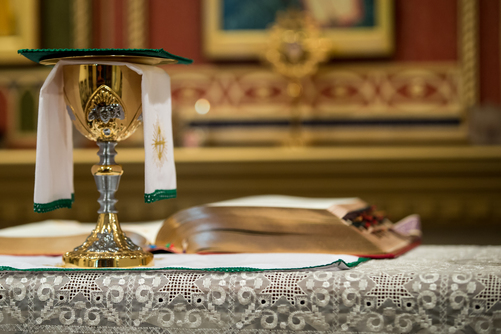
Eucharist
“The Eucharist is ‘the source and summit of the Christian life.’
‘The other sacraments, and indeed all ecclesiastical ministries and works of the apostolate, are bound up with the Eucharist and are oriented toward it. For in the blessed Eucharist is contained the whole spiritual good of the Church, namely Christ himself, our Pasch.’
“’The Eucharist is the efficacious sign and sublime cause of that communion in the divine life and that unity of the People of God by which the Church is kept in being. It is the culmination both of God’s action sanctifying the world in Christ and of the worship men offer to Christ and through him to the Father in the Holy Spirit.’
“Finally, by the Eucharistic celebration we already unite ourselves with the heavenly liturgy and anticipate eternal life, when God will be all in all.” (Catechism of the Catholic Church)
For more information go to USCCB The Mass.
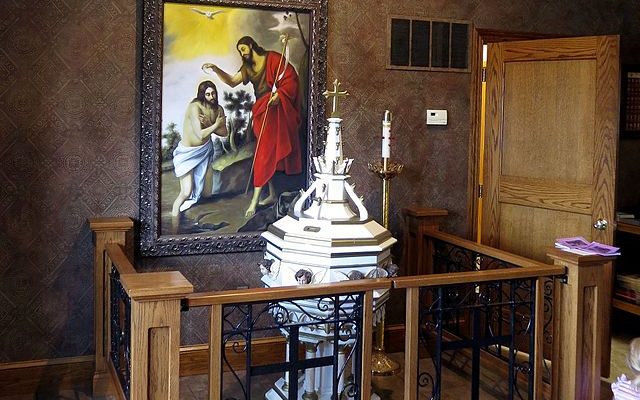
Baptism
The origin and foundation of Christian Baptism is Jesus. Before starting his public ministry, Jesus submitted himself to the baptism given by John the Baptist. The waters did not purify him; he cleansed the waters. . . . Jesus did not need to be baptized because he was totally faithful to the will of his Father and free from sin. However, he wanted to show his solidarity with human beings in order to reconcile them to the Father. By commanding his disciples to baptize all nations, he established the means by which people would die to sin – Original and actual – and begin to live a new life with God.
In Baptism, the Holy Spirit moves us to answer Christ’s call to holiness. In Baptism, we are asked to walk by the light of Christ and to trust in his wisdom. We are invited to submit our hearts to Christ with ever deeper love.
For more information so to USCCB Baptism.

Penance
Jesus entrusted the ministry of reconciliation to the Church. The Sacrament of Penance is God’s gift to us so that any sin committed after Baptism can be forgiven. In confession we have the opportunity to repent and recover the grace of friendship with God. It is a holy moment in which we place ourselves in his presence and honestly acknowledge our sins, especially mortal sins. With absolution, we are reconciled to God and the Church. The Sacrament helps us stay close to the truth that we cannot live without God. “In him we live and move and have our being” (Acts 17:28).
For more information so to USCCB Penance
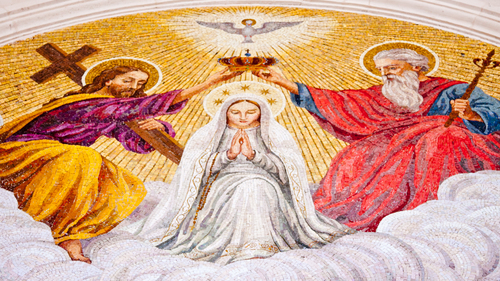
Confirmation
In the Sacrament of Confirmation, the baptized person is “sealed with the gift of the Holy Spirit” and is strengthened for service to the Body of Christ. Confirmation deepens our baptismal life that calls us to be missionary witnesses of Jesus Christ in our families, neighborhoods, society, and the world. . . . We receive the message of faith in a deeper and more intensive manner with great emphasis given to the person of Jesus Christ, who asked the Father to give the Holy Spirit to the Church for building up the community in loving service.
For more information so to USCCB Confirmation.
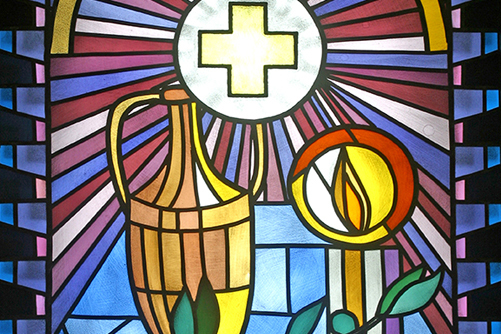
Anointing of the Sick
The purpose of the Church’s Sacrament of Anointing of the Sick is to confer special grace on the Christian experiencing the difficulties of serious illness or old age. Through the ministry of the priest, it is Jesus who touches the sick to heal them from sin – and sometimes even from physical ailment. His cures were signs of the arrival of the Kingdom of God. The core message of his healing tells us of his plan to conquer sin and death by his dying and rising.
The Rite of Anointing tells us there is no need to wait until a person is at the point of death to receive the Sacrament. A careful judgment about the serious nature of the illness is sufficient.
When the Sacrament of Anointing of the Sick is given, the hoped-for effect is that, if it be God’s will, the person be physically healed of illness. But even if there is no physical healing, the primary effect of the Sacrament is a spiritual healing by which the sick person receives the Holy Spirit’s gift of peace and courage to deal with their ailments.
For more information, go to USCCB Anointing Of The Sick.
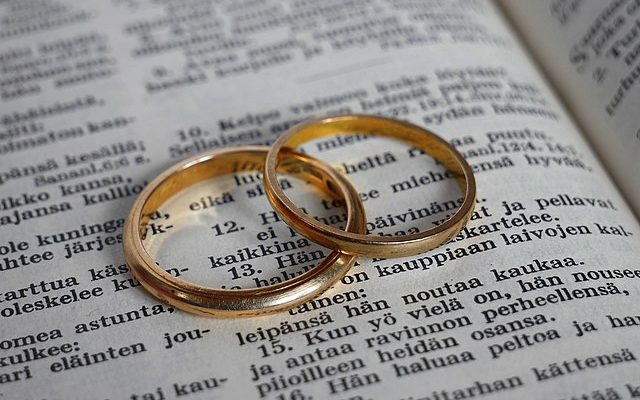
Matrimony
The Sacrament of Marriage is a covenant, which is more than a contract. Covenant always expresses a relationship between persons. The marriage covenant refers to the relationship between the husband and wife, a permanent union of persons capable of knowing and loving each other and God. The celebration of marriage is also a liturgical act, appropriately held in a public liturgy at church. Catholics are urged to celebrate their marriage within the Eucharistic Liturgy.
For more information so to USCCB Matrimony
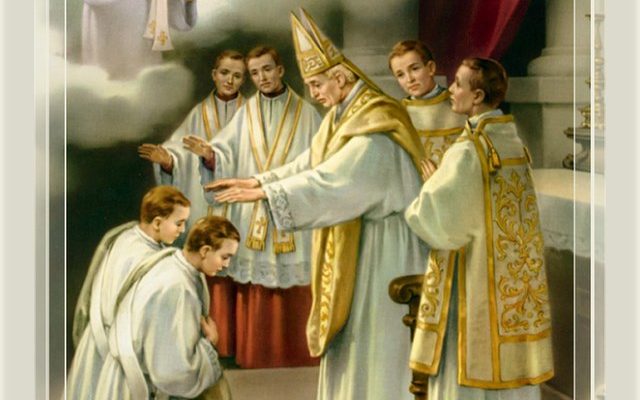
Holy Orders
From the moment of Jesus’ conception in the womb of Mary until his Resurrection, he was filled with the Holy Spirit. In biblical language, he was anointed by the Holy Spirit and thus established by God the Father as our high priest. As Risen Lord, he remains our high priest. . . . While all the baptized share in Christ’s priesthood, the ministerial priesthood shares this through the Sacrament of Holy Orders in a special way.
For more information so to USCCB Holy Orders

